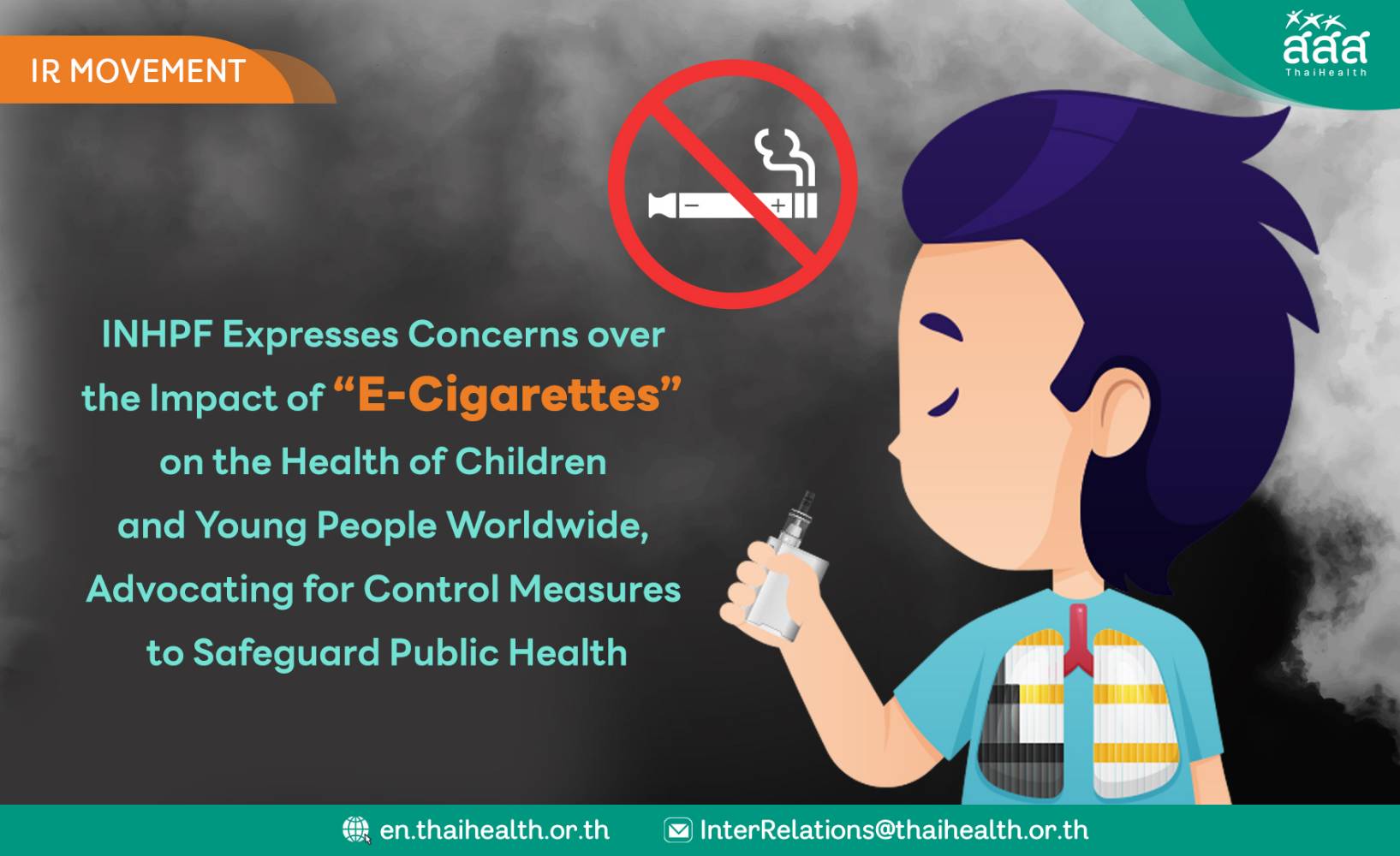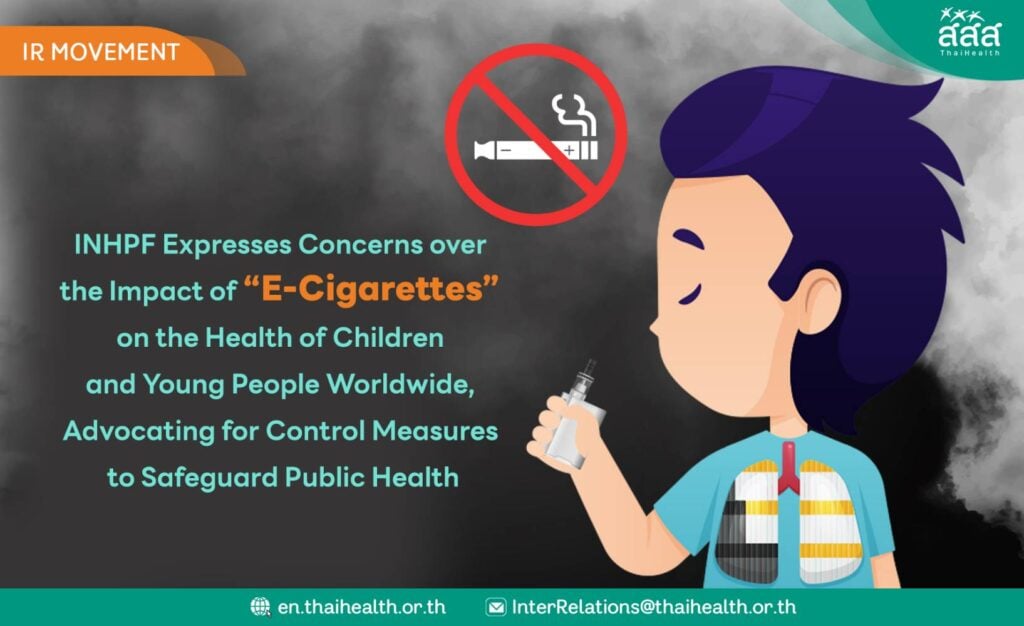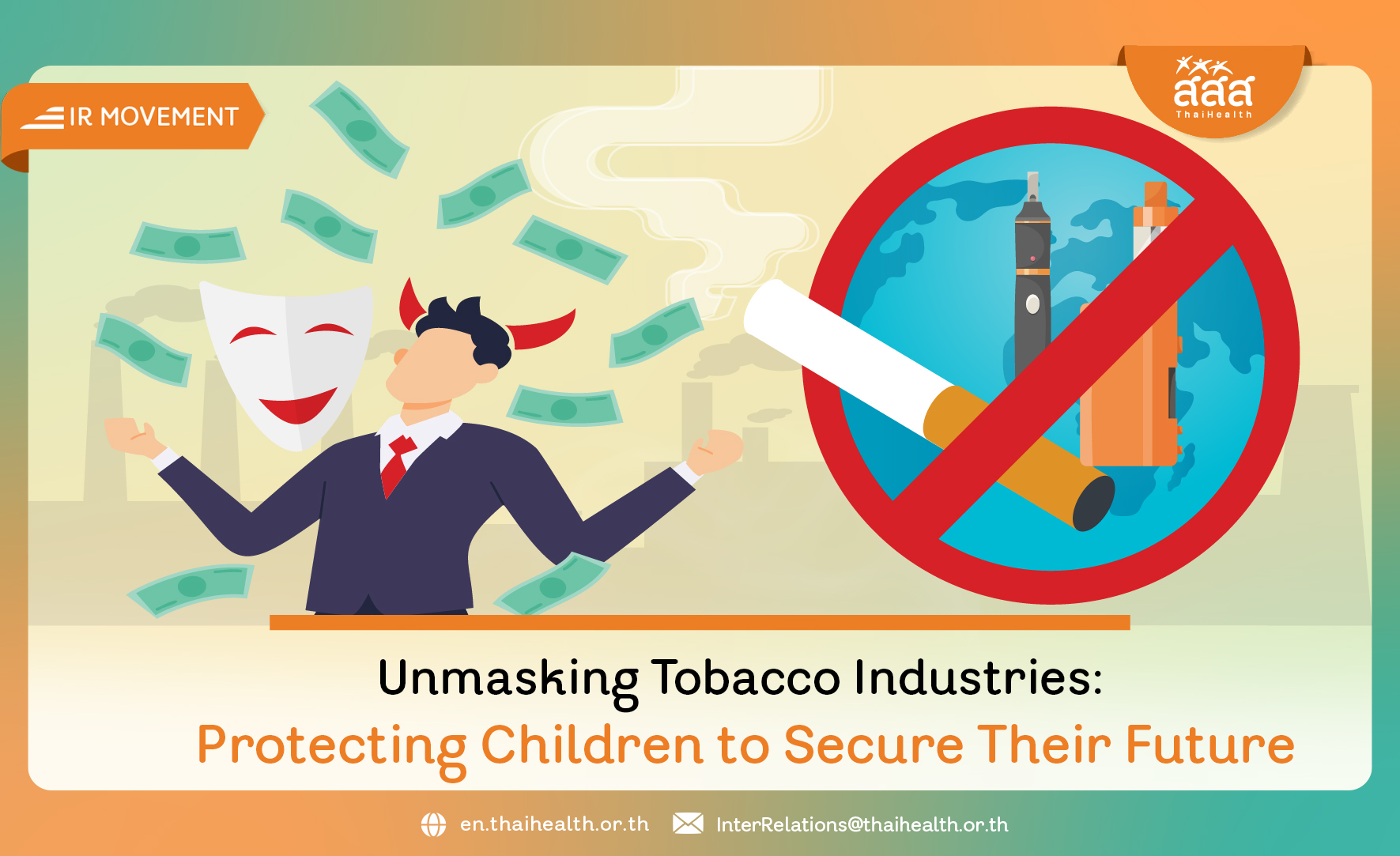
INHPF Expresses Concerns over the Impact of “E-Cigarettes” on the Health of Children and Young People Worldwide, Advocating for Control Measures to Safeguard Public Health

INHPF Expresses Concerns over the Impact of “E-Cigarettes” on the Health of Children and Young People Worldwide, Advocating for Control Measures to Safeguard Public Health
Over the past decade, e-cigarettes have been growing in popularity, with users worldwide increasing from 7 million in 2011 to 82 million in 2021. In particular, teenagers have shown greater interest and use of e-cigarettes. Studies worldwide have revealed that vaping can result in serious health issues. A major concern lies in the fact that young people starting with e-cigarettes are nearly four times more likely to smoke traditional cigarettes, compared to those who do not use e-cigarettes, due to the presence of nicotine as a stimulant.
According to the US Food and Drug Administration (FDA) and US Centers for Disease Control and Prevention (CDC), it was reported that in 2022, 2.55 million middle and high school students smoked e-cigarettes. Between 2020 and 2022, the proportion of teenagers aged 14-17 using e-cigarettes rose substantially from 2.1% to 11.8%. This figure was in line with the trend of young adults aged 18-24 whose smoking rates nearly doubled from 5.6% to 21.4%.
The 21st Annual Meeting of the International Network of Health Promotion Foundations 2024 (21st INHPF Annual Meeting 2024) and Queensland Prevention Symposium, held from September 2-5, 2024, in Queensland, Australia, was led by the International Network of Health Promotion Foundations (INHPF), comprising eight organizations from six countries. E-cigarettes remained one of the major topics of concern among many countries, with discussions focused on the impact of tobacco and vaping on public health.
The member countries discussed and shared the latest information on the trends of tobacco and e-cigarette smoking, their impacts on health, and the effectiveness of current strategies for prevention and smoking cessation. Dr. Nuttapun Supaka, Director of Partnership and International Relations Section, stated that in efforts to address e-cigarettes, 34 countries have banned the sale of e-cigarettes, and 87 countries have implemented control measures, advertising restrictions, health warnings, age limits, and flavor bans, while the remaining 74 countries do not have any measures or regulations on e-cigarettes in place. Among member countries joining the discussions, it was observed that there has been a remarkable rise in e-cigarette smoking among young people, which affects the health of children and young people and the likelihood of long-term nicotine addiction. There remain many challenges in enforcing control measures even in countries with bans on the sale of e-cigarettes. Consequently, all member countries agreed on the need for serious measures, including strict law enforcement, education, a variety of cessation services tailored to each country’s context, and a shared key message to ensure broader public reach.
The Australia’s Victorian Health Promotion Foundation (VicHealth) enacted new legislation to control the use of e-cigarettes on July 1, 2024. This law is aimed at protecting public health, especially children and young people, from the dangers of e-cigarettes and nicotine dependence.
Under this new legislation, effective from July 1, 2024, all kinds of e-cigarettes can only be sold through pharmacies, and any purchase of e-cigarettes containing nicotine requires a prescription to restrict access by children and young people. Additionally, an ID card must be presented, and each purchase is limited to a one-month quantity. E-cigarette flavors are limited to mint, menthol, and tobacco, while packaging will be plain to reduce their appeal to minors. More importantly, e-cigarette taxes are increased, and the government is continuing its efforts to raise public awareness about the impacts of e-cigarettes on health and their dangers.
Meanwhile, Taiwan’s Health Promotion Administration (HPA) made amendments to the tobacco control law, which came into effect on March 22, 2023, to safeguard the health of the Taiwanese, especially children and young people. Key provisions include a ban on the production and sale of cigarette-like products, such as e-cigarettes, and the requirement of health risk assessments for certain tobacco products before sale. The law also prohibits the addition of chemicals or other substances to tobacco products and raises the minimum smoking age to 20 to control access to cigarettes and prevent nicotine dependence among young people. Smoking bans have been extended to more public areas, while health warnings about the dangers of cigarettes have been enlarged to cover 50% of the packaging. In addition, penalties for violations of the law have been toughened.
Following over a year of enforcement, it reflects the Taiwanese government’s strong commitment to regulating tobacco products through coordinated efforts among a variety of central and local agencies in enforcing the law and curbing illegal tobacco products.
The smoking cessation initiatives supported by the Taiwanese government to promote public health are aimed at assisting smokers in quitting. They include free smoking cessation services, quitline services, more than 2,700 smoking cessation clinics nationwide, and smoking cessation classes in communities, hospitals, schools, and workplaces.
In the meantime, the Korea Health Promotion Institution in the in the Republic of Korea has focused on strictly regulating tobacco products since e-cigarettes and new tobacco products have grown in popularity rapidly. Specifically, it started with enforcing laws regarding the use and sale of e-cigarettes, including bans on advertising and promoting e-cigarettes in mainstream media and prohibition on sale to those under 19. Additionally, the government has mandated warning labels on e-cigarettes about the dangers of nicotine and limits on the amount of chemicals in e-cigarettes to ensure consumer safety.
In 2020, South Korea’s Ministry of Health launched a campaign to prohibit the use of e-cigarettes by encouraging its citizens to quit smoking and using all types of tobacco products. The campaign also involved the expansion of smoke-free public areas and strict measures against the sale of e-cigarettes.
South Korea’s smoking cessation programs and services focus on accessibility to a variety of services, such as smoking cessation centers that provide counseling and treatments for smokers, home visits that offer in-home counseling services and support to smokers unable to visit the center, education on smoking prevention for children and young people, and creation of smoke-free environments in schools and communities. Other services include smoking cessation support for military personnel, quitlines, and treatment provided by doctors and medical professionals at hospitals and clinics.
South Korea has also launched anti-vaping campaigns through advertisements broadcast across different platforms, such as television, radio, print media, social media, and billboards, to reach a wide audience. These campaigns highlight the health risks associated with e-cigarette use, such as pneumonia, cancer, and other health issues, to raise public awareness of the potential dangers.
In addition, South Korea aims to reduce smoking rates among its population by 2030, including adults and teenagers, and minimize the exposure to secondhand smoke in the workplace. To achieve this goal, it is developing plans and promoting various measures, such as raising tobacco taxes, banning additives in cigarettes, establishing a tracking system for the distribution of tobacco products, mandating the reporting and disclosure of tobacco product ingredients and emissions to provide consumers with accurate information, banning tobacco advertising in stores, prohibiting smoking in all public places, and developing smoking prevention programs for high-risk groups.
In the conclusion drawn from discussions among member countries of the INHPF, Professor Yik-Ying Teo, Vice President (Global Health) and Dean of the Saw Swee Hock School of Public Health at the National University of Singapore, highlighted that e-cigarettes pose a health threat, especially to young people, and there is no conclusive evidence to support the claim that e-cigarettes aid smoking cessation. Therefore, there is the need for strict regulations on e-cigarettes to limit access by young people and to mitigate public health risks.
The INHPF seeks to serve as a platform for advancing international cooperation in tackling the issue of e-cigarettes in line with the policies of the World Health Organization and its own vision. Additionally, it takes into the differences of policies in each country and serves an important role in helping its members to develop, review, and improve laws and enforcement measures to curb the spread of e-cigarettes.
////////////////////////////////////////////////////







